莎士比亚十四行诗Sonnet精选版
莎士比亚十四行诗第十八首

莎士比亚十四行诗第十八首Sonnet 18 铁冰译文1 Shall I compare thee to a summer's day 我该不该把你比作怡人的夏天?2 Thou art more lovely and more temperate: 你却比她更加可爱更加温情。
3 Rough winds do shake the darling buds of May, 五月的娇蕊总是被狂风吹断,4 And summer's lease hath all too short a date: 夏天也只是一道短暂的美景。
5 Sometime too hot the eye of heaven shines, 苍穹的目光有时会过于灼热,6 And often is his gold complexion dimm'd; 那金色的脸庞也常黯淡无光。
7 And every fair from fair sometime declines, 人间一切瑰丽终将失去秀色,8 By chance, or nature's changing course, untrimm'd; 湮没于不测风云和世事沧桑。
9 But thy eternal summer shall not fade, 但是,你常青的夏季永不消逝,10 Nor lose possession of that fair thou owest; 你拥有的美丽也将永不折损,11 Nor shall Death brag thou wander'st in his shade, 或许死神的阴影会笼罩着你,12 When in eternal lines to time thou growest; 你却和这不朽的诗句千古长存。
13 So long as men can breathe, or eyes can see, 只要人类还在呼吸、眼睛还在欣赏,14 So long lives this, and this gives life to thee. 我的诗就会活着,令你生命绽放。
莎士比亚诗歌原文

莎士比亚的一首十四行诗:
我能否将你比作夏天?
你比夏天更可爱,更温和;
狂风将五月的蓓蕾凋残,
夏日的勾留何其短暂。
有时,太阳照得太热,
又匆匆从天边隐退,
给六月的天空蒙上阴影,
而它—你的永恒的夏天—
却不凋残,也不失去光华,
死神无法夸口你向他投降,
因为你俯视死亡和王国,
你的美永远在人间留存。
因此,幸福的你啊,
你拥有自己最美的春夭,
将天上的四季指使,
永恒的春天和秋天在你处。
世界啊,能欣赏你的文采,
就永远把你记在心头吧,
像你现在这样活在我的诗里,使我的诗歌在你的光芒里繁荣。
莎士比亚十四行诗精选带翻译
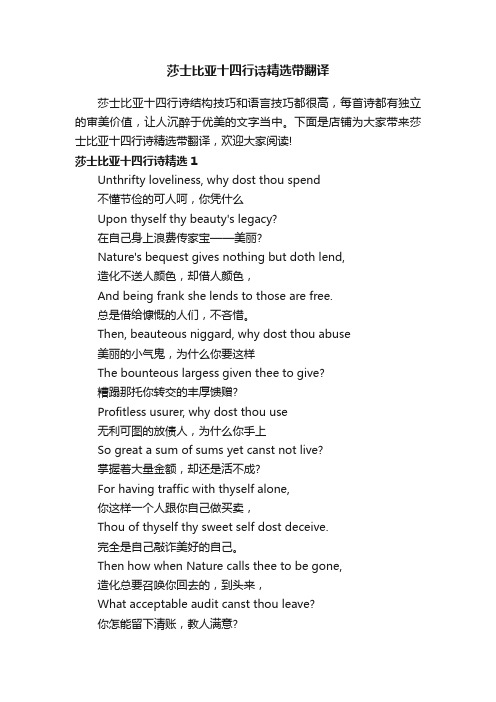
莎士比亚十四行诗精选带翻译莎士比亚十四行诗结构技巧和语言技巧都很高,每首诗都有独立的审美价值,让人沉醉于优美的文字当中。
下面是店铺为大家带来莎士比亚十四行诗精选带翻译,欢迎大家阅读!莎士比亚十四行诗精选1Unthrifty loveliness, why dost thou spend不懂节俭的可人呵,你凭什么Upon thyself thy beauty's legacy?在自己身上浪费传家宝——美丽?Nature's bequest gives nothing but doth lend,造化不送人颜色,却借人颜色,And being frank she lends to those are free.总是借给慷慨的人们,不吝惜。
Then, beauteous niggard, why dost thou abuse美丽的小气鬼,为什么你要这样The bounteous largess given thee to give?糟蹋那托你转交的丰厚馈赠?Profitless usurer, why dost thou use无利可图的放债人,为什么你手上So great a sum of sums yet canst not live?掌握着大量金额,却还是活不成?For having traffic with thyself alone,你这样一个人跟你自己做买卖,Thou of thyself thy sweet self dost deceive.完全是自己敲诈美好的自己。
Then how when Nature calls thee to be gone,造化总要召唤你回去的,到头来,What acceptable audit canst thou leave?你怎能留下清账,教人满意?Thy unused beauty must be tombed with thee,美,没有用过的,得陪你进坟墓,Which, used, lives th' executor to be.用了的,会活着来执行你的遗嘱。
莎士比亚十四行诗翻译和解读
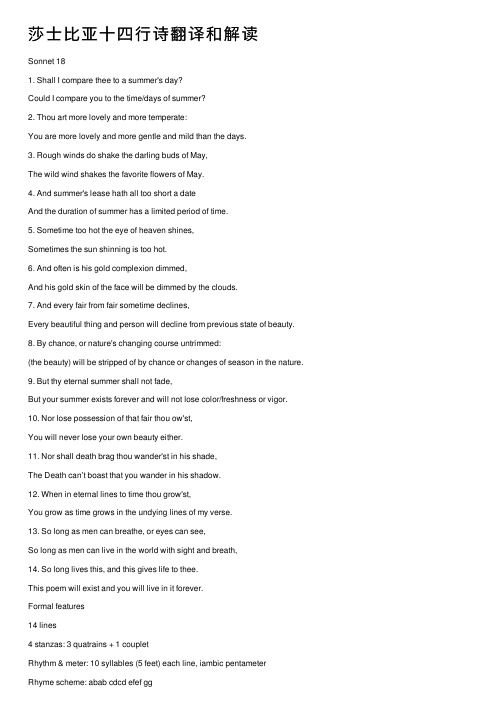
莎⼠⽐亚⼗四⾏诗翻译和解读Sonnet 181. Shall I compare thee to a summer's day?Could I compare you to the time/days of summer?2. Thou art more lovely and more temperate:You are more lovely and more gentle and mild than the days.3. Rough winds do shake the darling buds of May,The wild wind shakes the favorite flowers of May.4. And summer's lease hath all too short a dateAnd the duration of summer has a limited period of time.5. Sometime too hot the eye of heaven shines,Sometimes the sun shinning is too hot.6. And often is his gold complexion dimmed,And his gold skin of the face will be dimmed by the clouds.7. And every fair from fair sometime declines,Every beautiful thing and person will decline from previous state of beauty.8. By chance, or nature's changing course untrimmed:(the beauty) will be stripped of by chance or changes of season in the nature.9. But thy eternal summer shall not fade,But your summer exists forever and will not lose color/freshness or vigor. 10. Nor lose possession of that fair thou ow'st,You will never lose your own beauty either.11. Nor shall death brag thou wander'st in his shade,The Death can’t boast that you wander in his shadow.12. When in eternal lines to time thou grow'st,You grow as time grows in the undying lines of my verse.13. So long as men can breathe, or eyes can see,So long as men can live in the world with sight and breath,14. So long lives this, and this gives life to thee.This poem will exist and you will live in it forever.Formal features14 lines4 stanzas: 3 quatrains + 1 coupletRhythm & meter: 10 syllables (5 feet) each line, iambic pentameterRhyme scheme: abab cdcd efef ggStructure:1st – 2nd quatrains: an introduction to and development of a problem3rd quatrain: a volta or a turn “突转”(a change in direction, thought, or emotion)the couplet: a summary or conclusionThe theme:The main theme is t he power of the speaker’s poem to defy time and last forever, carrying the beauty of the beloved down to future generations.What is it about?The speaker opens the poem with a question addressed to the beloved: “Shall I compare thee toa summer’s day?” The next eleven lines are devoted to such a comparison. Summer: (Line 3: rough winds;4:too short;5. too hot;6. too dimmed;7&8. beautiful things will die) Sonnet 18 is the first poem in the sonnets not to explicitly encourage the young man to have children. The “procreation” sequence of the first 17 sonnets ended with the speaker’s realization that the young man might not need children to preserve his beauty; he could also live forever in this poem.Figures of speechIn line (5 ) There is a Metaphor .In line ( 5+6 ) There is a Personification .( eye of Heaven shines ) : Eye of heaven = the sunThe sun became dark because dark of clouds .In Line (9+10+12 ) There is a Hyperbole .In Line ( 11 )There is a personification .In Line ( 14 ) There is an Inverted order .Analysis: (拓展)The poem works at a rather curious level of achieving its objective through dispraise.The summer's day is found to be lacking in so many respects (too short, too hot, too rough, and sometimes too dingy), but curiously enough one is left with the abiding impression that 'the lovely boy' is in fact like a summer's day at its best, fair, warm, sunny, temperate, one of the darling buds of May, and that all his beauty has been wonderfully highlighted by the comparison.Sonnet 1301. My mistress' eyes are nothing like the sun;My lady’s eyes aren’t like the sun at all.2. Coral is far more red, than her lips red:Coral is much redder than her lips.3. If snow be white, why then her breasts are dun;If snow is white, then her breasts are brown.4. If hairs be wires, black wires grow on her head.If hair is as coarse as threads, then her hair is full of black threads.5. I have seen roses damasked, red and white,I have seen the pinkish, red and white roses.6. But no such roses see I in her cheeks;But I can see such kinds of roses in her cheeks.7. And in some perfumes is there more delightThere is much tempting/attractive fragrance.8. Than in the breath that from my mistress reeks.The fragrance is more attractive than her steamy, sweaty and unsavory smells.9. I love to hear her speak, yet well I knowI like listening to her speaking, but I am also aware that10. That music hath a far more pleasing sound:The sound of music is much more favorable than her sound.11. I grant I never saw a goddess go,I admit that I never saw a goddess walking by.12. My mistress, when she walks, treads on the ground:My mistress stamps on the floor when she walks.13. And yet by heaven, I think my love as rare,But I can swear to God that my lover is as precious as15. As any she belied with false compare.As any woman who has been misrepresented by ridiculous comparisons.Formal features14 lines4 stanzas: 3 quatrains + 1 coupletRhythm & meter: 10 syllables (5 feet) each line, iambic pentameterRhyme scheme: abab cdcd efef ggStructure:1st – 2nd quatrains: an introduction to and development of a problem3rd quatrain: a volta or a turn “突转”(a change in direction, thought, or emotion)the couplet: a summary or conclusionThemeThe poet suggests their love is rare because he does not desire her to be something she is not.It's about finding love in spite of (or maybe even because of) physical flaws.It pokes fun at our obsession with looks and to show how ridiculous it is to ask any person to live up to some ideal of perfect beauty.Figures of speechNegative similesSimile may also be expressed in the negative form“My mistress’ eyes are nothing like the sun”Etc.Ironic toneThe sonnet appears to be humorous, but the couplet displays the deeply romantic tone of the poem.Analysis(拓展)In many ways, Shakespeare’s sonnets subvert and reverse the conventions of the Petrarchan love sequence: the idealizing love poems, for instance, are written not to a perfect woman but to an admittedly imperfect man, and the love poems to the dark lady are anything but idealizing, like this one. He describes the woman that he loves in extremely unflattering terms but claims that he truly loves her, which lends credibility to his claim because even though he does not find her attractive, he still declares his love for her.Sonnet 1291. The expense of spirit in a waste of shameThe expenditure of sexual energy in a desert of shameful moral decay2. Is lust in action: and till action, lustIs the lust/letch acting: and before having sexual intercourse, lust3. Is perjured, murderous, bloody, full of blame,Is dishonest, murderous, violent and blameworthy with a lot of guilt.4. Savage, extreme, rude, cruel, not to trust;Barbaric, extreme, rude, cruel, and untrustworthy.5. Enjoyed no sooner but despised straight;As soon as lust has been enjoyed, it is hated.6. Past reason hunted; and no sooner had,Lust is pursued beyond the control of reason, as soon as lust is fulfilled,7. Past reason hated, as a swallowed bait,It is hated irrationally like a bait that a fish swallows8. On purpose laid to make the taker mad.(The bait) set on purpose to make the trapped creature react with frenzy.9. Mad in pursuit and in possession so;10. Had, having, and in quest to have extreme;The taker is insane in pursuing one's lust and mad in possessing the object of lust: going to extremes in having had it, in the having of it, and in seeking to have it;11. A bliss in proof, and proved, a very woe;A heavenly sensation while it is being experienced. Once you are done, it is a true sorrow.12. Before, a joy proposed; behind a dream.An expected joy exists before having it; after having it, it seems like a dream.13. All this the world well knows; yet none knows wellEveryone in the world knows it very well, but no one knows14. To shun the heaven that leads men to this hell.To avoid the tempting sense of delight which leads men to hell.Formal features14 lines4 stanzas: 3 quatrains + 1 coupletRhythm & meter: 10 syllables (5 feet) each line, iambic pentameterRhyme scheme: abab cdcd efef ggStructure:1st – 2nd quatrains: an introduction to and development of a problem3rd quatrain: a volta or a turn “突转”(a change in direction, thought, or emotion)the couplet: a summary or conclusionThemeAbout lust.–Lines 1-2: lust in action (shameful and wasteful...)–Lines 3-4: lust before action (dishonest, murderous, bloody…)–Lines 5-8: a comparison between lust before and after action (enjoyed vs.despised; both are past-reason / mad) – lust causes madness!–Lines 9-12: a comparison between lust before and after action. (bliss vs. woe;joy vs. dream) – lust causes sadness and disillusionment.–Lines 13-14: a conclusion.Figures of speechSimile: taker of lust as a hooked fishPersonification: lust as a personContrasts: "before" vs. "behind" (after), "heaven" vs. "hell," and so on.Analysis (拓展)The profound hatred of sexuality, sexual pessimismIts hatred of sexuality derives from the Christian imperative of the virginal life and the dislike of all bodily functionsIt gives essentially a phallo-centric view of sexImpersonal tone: The speaker never says outright that he is writing about his own experience; instead, he presents the poem as an impersonal description, a catalogue of the kinds of experience offered by lust.。
莎士比亚精选十四行诗
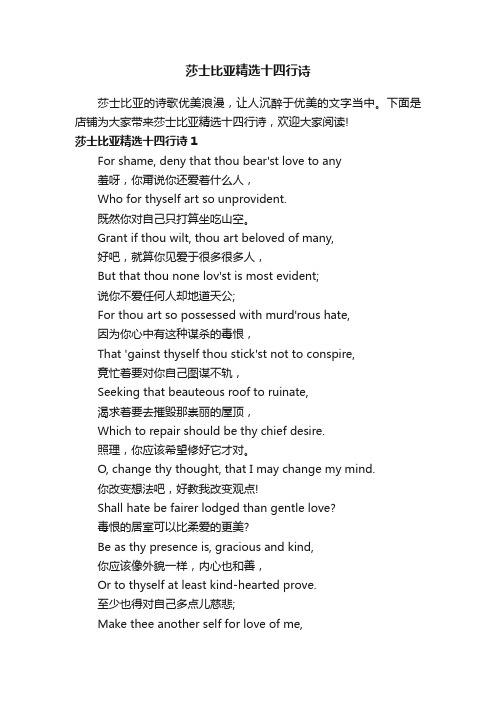
莎士比亚精选十四行诗莎士比亚的诗歌优美浪漫,让人沉醉于优美的文字当中。
下面是店铺为大家带来莎士比亚精选十四行诗,欢迎大家阅读!莎士比亚精选十四行诗1For shame, deny that thou bear'st love to any羞呀,你甭说你还爱着什么人,Who for thyself art so unprovident.既然你对自己只打算坐吃山空。
Grant if thou wilt, thou art beloved of many,好吧,就算你见爱于很多很多人,But that thou none lov'st is most evident;说你不爱任何人却地道天公;For thou art so possessed with murd'rous hate,因为你心中有这种谋杀的毒恨,That 'gainst thyself thou stick'st not to conspire,竟忙着要对你自己图谋不轨,Seeking that beauteous roof to ruinate,渴求着要去摧毁那崇丽的屋顶,Which to repair should be thy chief desire.照理,你应该希望修好它才对。
O, change thy thought, that I may change my mind.你改变想法吧,好教我改变观点!Shall hate be fairer lodged than gentle love?毒恨的居室可以比柔爱的更美?Be as thy presence is, gracious and kind,你应该像外貌一样,内心也和善,Or to thyself at least kind-hearted prove.至少也得对自己多点儿慈悲;Make thee another self for love of me,你爱我,就该去做另一个自身,That beauty still may live in thine or thee.使美在你或你后代身上永存。
莎士比亚经典十四行诗附译文

莎士比亚经典十四行诗附译文莎士比亚十四行诗结构技巧和语言技巧都很高,每首诗都有独立的审美价值,让人沉醉于优美的文字当中。
下面是店铺为大家带来莎士比亚经典十四行诗附译文,希望大家喜欢!莎士比亚经典十四行诗一Love is too young to know what conscience is;Yet who knows not conscience is born of love?Then, gentle cheater, urge not my amiss,Lest guilty of my faults thy sweet self prove:For, thou betraying me, I do betrayMy nobler part to my gross body's treason;My soul doth tell my body that he mayTriumph in love; flesh stays no father reason;But, rising at thy name, doth point out theeAs his triumphant prize. Proud of this pride,He is contented thy poor drudge to be,To stand in thy affairs, fall by thy side.No want of conscience hold it that I callHer 'love' for whose dear love I rise and fall.莎士比亚经典十四行诗译文爱神太年轻,不懂得良心是什么;但谁不晓得良心是爱情所产?那么,好骗子,就别专找我的错,免得我的罪把温婉的你也牵连。
因为,你出卖了我,我的笨肉体又哄我出卖我更高贵的部分;我灵魂叮嘱我肉体,说它可以在爱情上胜利;肉体再不作声,一听见你的名字就马上指出你是它的胜利品;它趾高气扬,死心蹋地作你最鄙贱的家奴,任你颐指气使,或倒在你身旁。
十四行诗116-威廉·莎士比亚
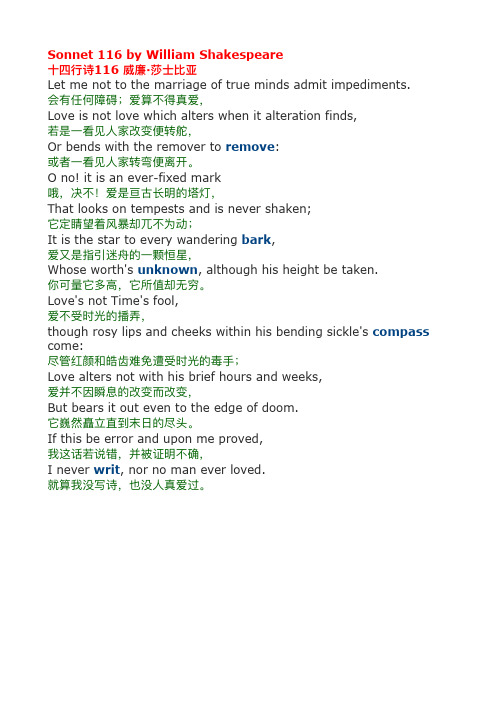
Sonnet 116 by William Shakespeare⼗十四⾏行行诗116 威廉·莎⼠士⽐比亚Let me not to the marriage of true minds admit impediments. 会有任何障碍;爱算不不得真爱,Love is not love which alters when it alteration finds,若是⼀一看⻅见⼈人家改变便便转舵,Or bends with the remover to remove:或者⼀一看⻅见⼈人家转弯便便离开。
O no! it is an ever-fixed mark哦,决不不!爱是亘古⻓长明的塔灯,That looks on tempests and is never shaken;它定睛望着⻛风暴暴却⺎兀兀不不为动;It is the star to every wandering bark,爱⼜又是指引迷⾈舟的⼀一颗恒星,Whose worth's unknown, although his height be taken.你可量量它多⾼高,它所值却⽆无穷。
Love's not Time's fool,爱不不受时光的播弄弄,though rosy lips and cheeks within his bending sickle's compass come:尽管红颜和皓⻮齿难免遭受时光的毒⼿手;Love alters not with his brief hours and weeks,爱并不不因瞬息的改变⽽而改变,But bears it out even to the edge of doom.它巍然矗⽴立直到末⽇日的尽头。
If this be error and upon me proved,我这话若说错,并被证明不不确,I never writ, nor no man ever loved.就算我没写诗,也没⼈人真爱过。
莎士比亚十四行诗精选
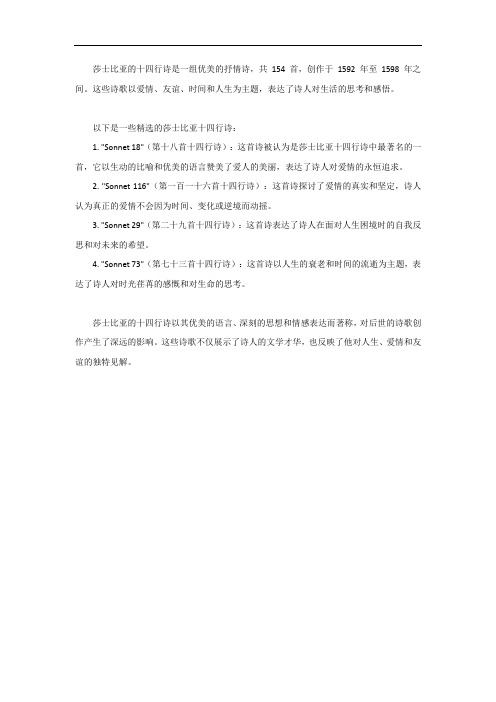
莎士比亚的十四行诗是一组优美的抒情诗,共154 首,创作于1592 年至1598 年之间。
这些诗歌以爱情、友谊、时间和人生为主题,表达了诗人对生活的思考和感悟。
以下是一些精选的莎士比亚十四行诗:
1. "Sonnet 18"(第十八首十四行诗):这首诗被认为是莎士比亚十四行诗中最著名的一首,它以生动的比喻和优美的语言赞美了爱人的美丽,表达了诗人对爱情的永恒追求。
2. "Sonnet 116"(第一百一十六首十四行诗):这首诗探讨了爱情的真实和坚定,诗人认为真正的爱情不会因为时间、变化或逆境而动摇。
3. "Sonnet 29"(第二十九首十四行诗):这首诗表达了诗人在面对人生困境时的自我反思和对未来的希望。
4. "Sonnet 73"(第七十三首十四行诗):这首诗以人生的衰老和时间的流逝为主题,表达了诗人对时光荏苒的感慨和对生命的思考。
莎士比亚的十四行诗以其优美的语言、深刻的思想和情感表达而著称,对后世的诗歌创作产生了深远的影响。
这些诗歌不仅展示了诗人的文学才华,也反映了他对人生、爱情和友谊的独特见解。
